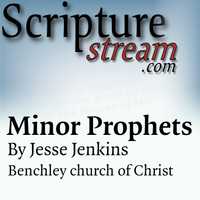- Haggai 1-2
Introduction
- The name Haggai means “festive.”
- We don’t know much about Haggai other than the additional mentions in Ezra 5:1-2; 6:14.
- The book was written during the second year of Darius, about 520 B.C.
- The message of the book is to rebuild the temple. Rebuilding was necessary if God was to bless the people.
Background history:
-
Three waves carried into Babylonian captivity from Judah:
-
606 B.C. – Daniel, Shadrach, Meshach, and Abednego
-
597 B.C. – Ezekiel
-
586 B.C. – Temple was destroyed
-
-
70 years of captivity in Babylon: 606-536 B.C.
-
In 549 B.C., Cyrus defeats the Medes, creating the Medo-Persian empire.
-
In 539 B.C., Cyrus captured Babylon, becoming the reigning world power.
-
Cyrus was a unique leader and was good to those in captivity. He not only allowed them to return to their home country but provided resources for them to rebuild.
-
Isaiah prophesied about the coming of Cyrus, calling him by name over 100 years in advance (Isaiah 44:28; 45:4).
-
Ezra 1:2-4 – Cyrus allowed people to return.
-
Ezra 3:11 – Cyrus allows cedar trees for the people to use to rebuild.
-
By the time of Haggai, the people had rebuilt their own houses, but not the house of God. Fourteen years the temple foundation had been in place, but nothing was built on it.
The messages of Haggai
Message 1: Your indifference is causing all the things you’re suffering (Haggai 1:1-15)
- Haggai 1:4 – Their indifference was the reason God had not blessed them. This is not the last time people have built their own houses to the exclusion of God’s house.
- Haggai 1:6-11 – God had refused to bless them.
- Haggai 1:12 – The remedy was repentance!
- Haggai 1:14-15 – The people heard the message and quickly got to work.
Message 2: The glory of the new temple (Haggai 2:1-9)
- This message came 3.5 weeks after the construction restarted.
- The feast of tabernacles was a time once a year where the people were to live in tents for seven days to commemorate the wilderness wanderings.
- Haggai 2:1-3 – The older people who remembered the first temple thought this one was nothing in comparison.
- Haggai 2:4 – God would bless them if they would be strong and obey Him.
- Haggai 2:7 – This was ultimately fulfilled in the kingdom of Christ (Hebrews 12:26-28). The treasures that cannot be shaken are those that God’s people store up by serving Him in this life, culminating in the treasure of heaven. See also Daniel 2:44.
- Haggai 2:9 – This is referring to the glory of the kingdom that cannot be shaken.
Message 3: Because of their lack of service, even what good they were doing was not acceptable to God (Haggai 2:10-19)
- Haggai 2:10-19 – God would now bless them since they were repairing the temple.
Message 4: While the earth and everything around was shaken, they would be blessed (Haggai 2:20-23)
- Haggai 2:23 – Zerubbabel would be the chosen leader, not so much because of him personally, but because of his lineage.
Lessons for us
- Don’t be negligent. Be busy in serving God.
- God will not bless those who are indifferent in building His house.
- Do not expect God’s blessings while not honoring Him.
- If you mix clean and unclean, you have a body of uncleanness.
- All preaching must have a “thus sayeth the Lord.”
